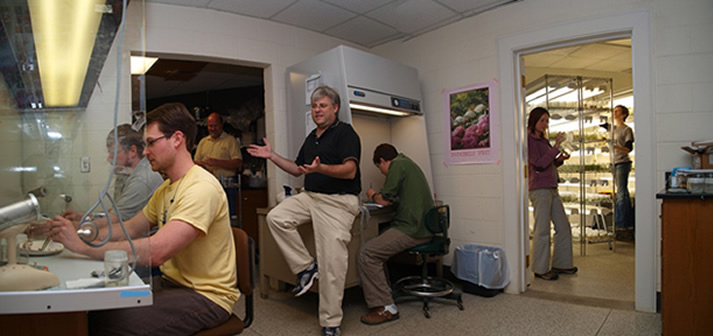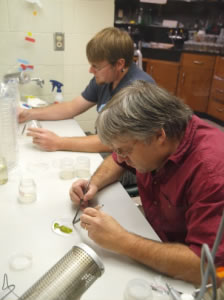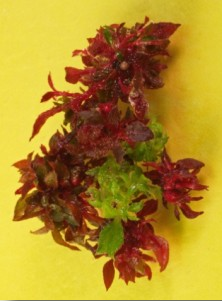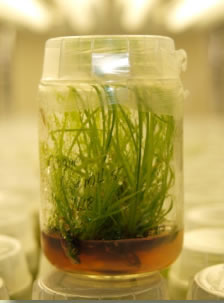Plant Tissue Culture

Plant tissue culture broadly refers to growing plant cells, tissues, organs, seeds or other plant parts in a sterile environment. The most common application of tissue culture is micropropagation, which usually involves the rapid multiplication of plants for commercial applications. Embryogenesis and organogenesis are other techniques whereby plants and organs are regenerated from cells. These techniques provide powerful tools to induce polyploidy, isolate mutations and stabilize chimeras, and regenerate triploid plants from endosperm tissue. Embryo rescue and ovule culture techniques may also be used to overcome problems associated with post fertilization barriers to hybridization such as triploid blocks and spontaneous abortion. At the Mountain Crop Improvement Lab, tissue culture has become an integral part of our plant breeding program. See selected papers for more information:
- Olsen, R.T., T.G. Ranney, and Z. Viloria. 2006. Reproductive behavior of induced allotetraploid xChitalpa and in vitro embryo culture of polyploidy progeny. J. Amer. Soc. Hort. Sci. 131(6):716-724.
- Touchell, D., J. Smith, and T.G. Ranney. 2008. Novel applications of plant tissue culture. Proc. Combined Inter. Plant Propagators’ Soc. 58: 196-199.
- Meyer, E.M., D.H. Touchell, and T.G. Ranney. 2009. In vitro shoot regeneration and polyploid induction from leaves of Hypericum species. HortScience 44(7):1957-1961.
- Hebert, C.J., D.H. Touchell, T.G. Ranney, and A.V. LeBude. 2010. In vitro shoot regeneration and polyploidy induction of Rhododendron ‘Fragrantissimum Improved’. HortScience 45(4):801-804.
- Rounsaville, T.J., D.H. Touchell, T.G. Ranney, and F.A. Blazich. 2011. Micropropagation of Mahonia ‘Soft Caress’. Hortscience 46(7):1010-1014.
- Rounsaville, T.J., D.H. Touchell, and T.G. Ranney. 2011. Fertility and reproductive pathways in diploid and triploid Miscanthus sinensis. Hortscience 46(10):1353-1357. (HortScience Cover)
- Parris, J.K., D.H. Touchell, T.G. Ranney, and J. Adelberg. 2012. Basal Salt Composition, Cytokinins, and Phenolic Binding Agents Influence In Vitro Growth and Ex Vitro Establishment of Magnolia ‘Ann’. Hortscience 47(11):1625-1629.
- Oates, K.M, D.H Touchell, T.G Ranney. 2013. Induced Variation in Tetraploid Rudbeckia subtomentosa ‘Henry Eilers’ Regenerated from Gamma-irradiated Callus. Hortscience 48(7):831-834.
- Lattier, J.D., D.H. Touchell, T.G. Ranney, J.C. Smith. 2013. Micropropagation and Polyploid Induction of Acer platanoides ‘Crimson Sentry’. J. Environ. Hort. 31(4):246-252.
- Lattier, J.D., D.H. Touchell, and T.G. Ranney. 2014. Micropropagation of an Interspecific Hybrid Dogwood (Cornus ‘NCCH1’). Propagation of Ornamental Plants 14(4):184-190.
- Touchell, D.H., I.E. Palmer, and T.G. Ranney. 2020. In vitro ploidy manipulation for crop improvement. Front. Plant Sci. 11:722. https://doi.org/10.3389/fpls.2020.00722


